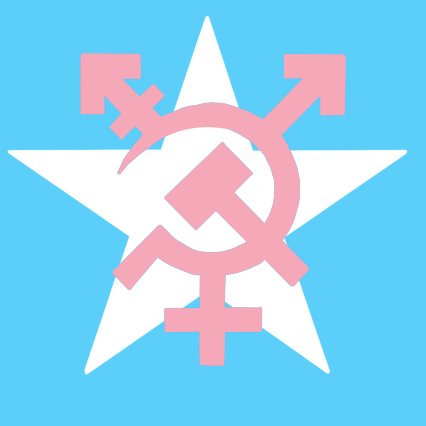Hello comrades!
I think it’s important for our comrades to have a safe place where they can ask questions about trans identities and trans issues in good faith.
The first step in garnering support is education, however asking every single trans person to constantly take on the burden of educator is, frankly, ridiculous, especially when so often the questions are not being asked in good faith, and there are very real consequences to the spread of misinformation.
As such, I know that there are likely comrades here who have questions they have been too scared to ask, or feel like it would be inappropriate to pose to some stranger.
Trans or questioning comrades are also welcome to ask questions here, of course, and are welcome to answer any questions they feel comfortable answering. The thing about the trans experience is that it is different for everyone. We all have different material conditions, we all have different interactions with ourselves and the world around us, and so, of course, there is no universal truth that governs what it means to be trans.
I can’t guarantee that we’ll have an answer for everything, and I can’t guarantee that the answers we do have will be satisfactory, but I can guarantee that as long as you are asking out of a genuine desire to inform yourself and learn more, then I will do my best to engage with you as a comrade and an ally.


Comrade @fellowkid did a great job answering this question for you. I’m more familiar with trans issues in Cuba than I am in China, where, as was mentioned, hormone therapy and gender confirmation surgery is provided by the state.
An additional mention of the soon-to-be update to the Family Code, they’re aiming to recognize all forms of family units. This coverage extends far pass same-sex marriage, and would consider the legal classification of a marriage to include, for instance, platonic unions and polyamorous partnerships.
Cuba is a world-leader in the protection and forwarding of trans rights, and provides more reliant and consistent access to medical care than most imperial core nations.
As for China, it’s been making huge strides lately in increasing access to medical care for trans individuals. There was a study published in BMC Public Health regarding discrimination and perceived discrimination of various LGBT individuals in China. It largely found that the biggest hurdle to LGBT acceptance is from family, where queer participants ranked discrimination from family to be the most prevalent, which coincided with heterosexual participants being least accepting of LGBT people in their own family, but largely accepting of LGBT people otherwise.
This same study also found that gay men and trans people are the most likely to stay in the closet. However, medical interactions were found in this study to be the least discriminatory, which is incredibly heartening, as access to medical care is the first and most crucial stumbling block on the road to trans acceptance. China has been taking a very science-based stance on this (unlike certain anglo countries cough cough) and has been pushing for medical care regardless of cultural acceptance.
It was also found that an increase in a region’s economic prosperity led to a decrease in LGBT discrimination, meaning that as people’s lives improved they were less bothered by the gays down the street.
Last year a documentary “A Day of Trans” directed by trans filmmaker Yennefer Fang released, which interviews four trans individuals of different generations. https://www.globaltimes.cn/page/202111/1239389.shtml
One of the people interviewed, a trans man, won a discrimination case against his employer back in 2016, when he became a public face in the fight for systemic protections.
In 1995 Jin Xing was the first person to openly have gender confirmation surgery. She’s a famous dancer, choreographer, and tv presenter that is shown nation-wide, and has been since before most western countries would allow a trans person on tv as anything more than a punchline about degeneracy and prostitution.
In Cuba, the first trans “diagnosis” was in 1972, a 23 year old trans man who lived openly as a man. In response to this, the Federation of Cuban Women established the National Task Force for the Diagnosis and Treatment of Gender Identity Disorders in 1979 coordinated by the National Working Group for Sex Education (now CENESEX).
The Task Force was a multidisciplinary association of medical professionals who provided counselling, hormones, and gender confirmation surgeries. They also lobbied for changes to laws regarding trans people, and by 1997 Cubans were able to change their names and photos on their government IDs.
From the start, their belief was that the right to health care superseded any other arguments against the inclusion and treatment of trans individuals.
Because the task force was initially proposed by the Federation of Cuban Women, in Cuba the struggle for queer rights is seen as inherently a fight against colonial patriarchy and instilled machismo. Liberation for queers is part and parcel with the liberation of women from the rigid constructs of cisheteronormative gender binaries which demand a rigid idea of the separation of masculinity and femininity.
In 2001 Cuba released the first National Strategy for Comprehensive Attention to Transsexual People. In order to fulfill the constitutional promise of health care, the Strategy included developing integrated clinical and mental health care for gender diverse individuals, setting transsexual research priorities, designing public education, implementing sensitivity training, and proposing legal mechanism to protect social and civil rights of trans people.
The Strategy mandates intersectoral cooperation among the Ministries of Health and the Interior, Supreme Court, Attorney General’s office, and social and political organizations such as the FMC, labor unions, and neighborhood block associations. Organizationally, it is coordinated by the National Commission for Comprehensive Attention to Transsexual People, established in 2005.
Resolution 126 issued by the Ministry of Public Health in 2004 mandated comprehensive health services for transsexual people in Cuba, including establishment of a specialized clinic to provide integrated clinical care such as psychological counseling, hormone therapy, and sex reassignment surgery.
Resolution 126 paved the way for a Commission-directed clinic to be established in Havana. Health care provision here, both free and voluntary, is based on two fundamental tenets: first, to reinforce the bio-psycho-social approach of Cuban health care through direct services and inter-consultation by a multi-disciplinary team that works with each person; and second, to create a safe, nonjudgmental space where privacy and confidentiality are protected by professionals trained in transgender issues
This is not to say that Cuba is perfect. There is of course still a large cultural aversion to trans identities. The process of transitioning itself is also flawed: it involves two years of extensive interviewing and counselling where a committee of multidisciplinary specialists confirm whether or not you are trans, meaning the Commission ultimately decides on whether an individual should be “diagnosed” as trans.
After the first gender confirmation surgery, there was public outcry, and the surgeries were suspended for a time. The individual who had the surgery was the subject of derision, and was kicked out of their family home. However, Cuba has come a long way, and is without a doubt a world leader in trans care.
The Commission (with CENESEX) also supports the declassification of transsexual as a mental illness, a declassification that may combat some of the stigma, and will also improve the process of treatment seeking, whereby it would no longer be necessary for the Commission to “diagnose” whether a patient seeking transition is trans.